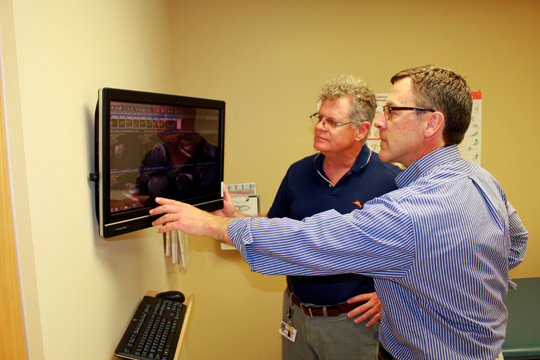Orthopedics offers top care to local patients

U.P. Health System-Portage hospital photo Dr. Ron Ronquist and Dr. Mike Carter compare notes on a set of images as they discuss treatment options for a patient at UP Health System-Portage.
Orthopedics is a branch of medicine concerning the skeletal system and related structures including the tendons and ligaments. Many people seek orthopedic surgery after an injury but many more seek it as they age and their joints begin to naturally deteriorate. Because of the range of issues and patients dealt with by orthopedic surgeons, the field contains a number of sub-specialties.
U.P. Health System- Portage employs two full-time orthopedic surgeons, Dr. Mike Carter and Dr. Ron Ronquist. Dr. Ronquist is a general orthopedic surgeon who does a lot of total joint replacements and Dr. Carter is a specialist in Sports Medicine, though most of his patients aren’t actually athletes.
“Sports Medicine deals with management of athletes and trying to get them back to their sport as soon as possible,” said Dr. Carter.
That means doing larger surgeries through smaller incisions to decrease recovery time. The same principle works on non-athletes as well, however.
Serving non-athletes means that Dr. Carter is often doing the same kind of work as Dr. Ronquist.
“Some sub-specialists need to be in a bigger town,” said Dr. Ronquist, “This type of environment is better suited to a general orthopedic surgeon.” Most of Dr. Ronquist’s patients are in their 60s and 70s and have a joint condition like arthritis which prevents them from living normal healthy lives.
While Drs. Ronquist and Carter are both surgeons, they don’t spend all of their time in the operating room, they also meet with patients in their office helping patients to manage their conditions without surgery for as long as possible.
“We don’t operate on everyone who comes in the door. A lot of people we’re able to treat with rehab, bracing, or activity modification,” said Dr. Carter.
Dr. Ronquist also tries to help his patients go without surgery for as long as possible.
“Most of the time my patients wish that they had done it sooner,” said Ronquist.
Putting off surgery for Dr. Ronquist’s patients increases the benefit in a number of ways. For one thing they get better “relative improvement” — they notice a more significant change than they would if the surgery were done sooner. It also helps to prevent the need for additional surgery down the road. Artificial joints are only working their best for twenty to twenty-five years so while a middle-aged potential patient may feel pretty old, they’re still pretty likely to outlive their replacement joint if they get it too early.
“We hesitate to do this in a 50-year-old,” said Dr. Ronquist, “the second time around is harder on the patient and on the surgeon.”
Other things that impact whether a patient is recommended for surgery include the patient’s weight and general health, their diet, whether they smoke, and even their dental health.
“If we just ignore some of these factors the risk of problems goes up,” said Dr. Ronquist, “you’ve got to meet me half way sometimes.”
Much of the standard patients’ satisfaction with the surgery has to do with the brief recovery time. Dr. Ronquist reported that while his patients may be advised to stay one or two nights in the hospital just in case, they are often up and walking around on the same day as the surgery, with full recovery in four to six weeks. Dr. Carter’s patients seldom spend a single night in the hospital, though their recovery time may be more like four to six months. Recovery time in both cases depends on the surgery, the age of the patient and their level of activity after the procedure, as well as before a potential procedure.
“Some people have an inaccurate belief that things wear out because we use them. A certain amount of activity is good for the body,” said Dr. Carter, “you’re more likely to have an injury if you’re usually inactive and suddenly try to do too much.”
“Listen to your body and don’t ignore warning signs such as pain and swelling,” agreed Dr. Ronquist, “stay active. Eat well but not too much.”
To learn more about orthopedic surgery at U.P. Health System – Portage, talk to your primary care provider, visit the Portage campus at 500 Campus Drive in Hancock, or call the orthopedics department at (906)483-1040.
EDITOR’S NOTE: This feature is part of an advertising package. All the content in this feature has been created or approved by the advertiser, which is solely responsible for the content. Businesses interested in being featured on the Business Page may call Yvonne Robillard at 483-2220.





